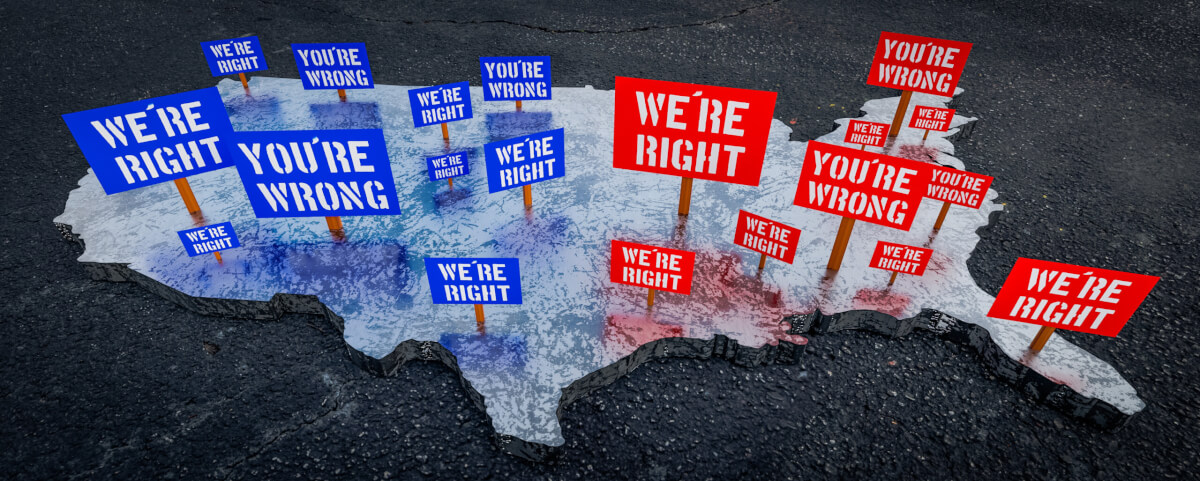ANN ARBOR, Mich. — Hostile political arguments on social media seem to be as common as vacation photos these days. Could simply seeing all the anger and vitriol be changing how people view the political arena entirely? New research from the University of Michigan sheds light on a troubling trend: the rise of political anger and cynicism, fueled by exposure to hostile and uncivil attacks on these platforms.
The study, recently published in the International Journal of Press/Politics, investigates the relationship between exposure to political attacks on social media and political cynicism. Lead author Ariel Hasell, assistant professor of communication and media and an affiliate of the Center for Political Studies at UM’s Institute for Social Research, and her colleagues found that people who were exposed to more political attacks on social media were more politically cynical.
Political cynicism, as defined by the researchers, goes beyond healthy skepticism. It involves a wholesale rejection of people and processes in democracy, and a belief that politicians are guided by corrupt, self-serving interests rather than a commitment to the public good. This cynicism can delegitimize democratic processes, distort people’s interpretations of political information, and lead to disengagement from politics.
“It’s important to understand how feelings of cynicism emerge because we’re seeing many democratic governments facing crises of legitimacy,” Hasell says in a media release. “Our findings provide some of the first evidence of how exposure to political attacks on social media might relate to political cynicism in the context of a U.S. presidential election.”
The Amplification of Anger and Hostility on Social Media
The study’s results, based on a panel survey of 1,800 American adults fielded during the 2020 election, show that perceived exposure to political attacks was associated with more anger about the state of the U.S., which was subsequently related to greater levels of political cynicism.
This finding is particularly concerning given the current political climate in the United States. A 2019 NBC/Wall Street Journal poll found that nearly 7 in 10 Americans reported being angry about the political establishment, and a 2023 survey by the Public Religion Research Institute showed that about a quarter of Americans agree that “true American patriots may have to resort to violence in order to save our country,” up from 15% in 2021.
Social media plays a significant role in amplifying this anger and hostility. Political content on these platforms is often toxic, and algorithms reward and amplify attacks because they’re engaging. Studies show this makes outrage more potent and visible, giving users a warped view of what the public believes.

“If your main source of news is social media, you are more likely to perceive politics as hostile and angry,” Hasell said. “And beyond the feelings that political attacks provoke, it matters how people perceive and read the temperature of ‘public emotions’ because this can impact assessments about the country’s well-being and its ability to solve problems and accomplish goals.”
The study also found that anxiety, another negative emotion elicited by uncertainty and threats, can be driven by political fearmongering and social media toxicity during a presidential election. While negative emotions aren’t necessarily bad for democracy – they can drive people to the polls and motivate advocacy – relentless negativity about a country “under threat” can also lead to frustration, disgruntlement, and disengagement.
“Anger can affect our ability to see things as they are, and make measured decisions that are important in a democracy,” Hasell said.
Breaking the Cycle: The Importance of Civil Dialogue
The researchers warn that as more people turn to social media for news and information, repeated exposure to political attacks may further promote political cynicism. This is a concern because cynicism can make it harder for people to make sense of political information, leading to apathy, disengagement, or even a turn towards fringe parties and antidemocratic forms of participation.
So what can citizens who use social media do to break this pattern? “An easy way to avoid getting angry and cynical is to be mindful about focusing on nonhostile, civil dialogue,” Hasell said. “If you are seeing a lot of hostility in your social media, you can think about re-curating and unfollowing people who are fomenting this kind of hostility. We don’t find that social media use in itself is making people angry and cynical, it has to do with how we decide to use it.”
As the United States approaches the 2024 presidential election, it’s likely that political hostility will surge online. This study serves as a timely reminder of the potential consequences of this toxicity for our democratic processes. It’s up to each of us to be mindful of the content we consume and share on social media, and to actively seek out and promote civil, constructive political dialogue. The health of our democracy may depend on it.

I have never taken part in social media yet I am a political cynic and have disengaged from politics even on a local level.
Ditto here.
Get rid of Lobbyists and their money.
Unfortunately I’m personally involved in local politics and I have to fight with a bunch of corrupt bastards all the time and I’m getting ready to resign. This is disgusting.
For me I think it was the realization that people are largely embedded in their political beliefs. Any amount of research and logic is explained away. I mean I do the same thing. And that realization I think has made people cynical about politics. Perhaps in the class rooms people were a bit more civil in expressing their opinions and this wasn’t as obvious before.
You’re not exactly doing the same thing if you’re aware of it. I’d give yourself a little more credit if I were you. And congratulations on being a critical thinker with self-reflection. Please train the people around you to be more competent As You Are
Or maybe people are talking about things of value rather than posting photos of their meal. Maybe it’s not cynical—-maybe it’s what’s going on.
People hate to admit that cynicism implies a certain measure of acceptance of what’s going on. They would prefer toxic positivity and head in the sand ostrich type behavior. Cynics are realists. But, you can always upgrade cynicism to stoicism
It’s important to acknowledge that blaming negative emotions for bad behavior doesn’t solve anything. Many politicians appear to prioritize their own interests over serving the public, and their dishonesty is evident in their words and actions. This pattern has been observed by many people, and it’s clear that we need elected citizens who prioritize the greater good over personal gain in order to improve the situation. We have no need or time for career politicians anymore. They must have term limits in congress. The Supreme Court lifetime appointment might be a good idea because of the wisdom necessary for that role but there should be an age limit. And if not an age limit then a cognitive testing limit if that would be considered ageism but we can’t have demented people dying on the Supreme Court and we can’t have dementia prescriptions in Congress at the level that they are right now.
This article is as specious as our government.
It starts off on a hilarious argument that the bickering on SM caused people to believe that politicians are corrupt and self serving. Well as a matter of FACT that is a perfect description of a politician.
As opposed to the brain behind this article we are not stupid. Sending money to a politician is an act of complete insanity. Campaign finance reform is our only hope but that would only hurt the politicians that would NEVER allow it to be mentioned let alone vote on it.
“[A] belief that politicians are guided by corrupt, self-serving interests rather than a commitment to the public good.” Now, why would anyone ever believe that?
The assumption of the authors of this “study” is that believing “politicians are guided by corrupt, self-serving interests rather than a commitment to the public good” is irrational and represents a defect in a person’s thinking. The purpose of this and similar “studies” is to marginalize those who reject the official narrative of events presented by the government and the corporate media.
Step back and look at the big picture — the starting point for knowing the truth about anything is to believe the opposite of what the government and the corporate media tell us. . .
The cynicism is completely warranted. In addition, we’re supposed to be a Constitutional Republic…not a “mob rule” democracy!
In my opinion, the demise of our public discourse is primarily due to the death of “professional journalism”, i.e. individualized objective reporting vs advocacy for the noble causes du jour. The “group think” in the MSM has been blatantly obvious since the word “gravitas” was disinterred from the vocabulary graveyard by virtually every outlet to describe POTUS George W. Bush in the space of about two weeks, in this case to cast shade on his ability to deal with foreign affairs. What a coincidence! The situation has only gotten worse ever since, e.g. the simultaneous switch to newly approved ways to describe things as per the current “approved thoughts”.
This grooming is no doubt targeted at making a “better, nicer society”, but is often perceived as a maddening dose of social shaming and thought control. Rather than “grooming the masses to be nicer”, it triggers resentment and rage that spills out in media posts.
“It involves a wholesale rejection of people and processes in democracy, and a belief that politicians are guided by corrupt, self-serving interests rather than a commitment to the public good.”
Our border is WIDE F@#$ing open. Illegals are pouring in. Tax money is being wasted feeding, housing, providing medical care for, and educating them in lieu of basic civic services in cities across the country. How is any of this for our public good? IT IS NOT OUR JOB TO TAKE CARE OF THE WORLD’S POOR. Corrupt and self-serving is exactly correct.